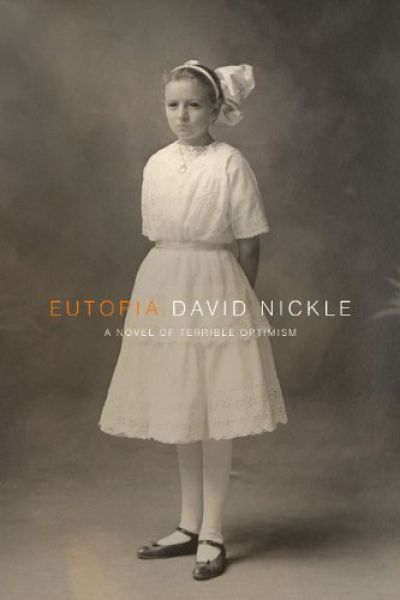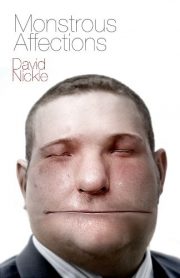Bold Plan for a Better Humanity
Eutopia
By David Nickle

28 May, 2015
0 comments

The first time I encountered a work by self-confessed Canadian David Nickle was during the 2009 Montreal Worldcon. I wandered by a huckster’s table and saw this looking back at me.
The cover art definitely got my attention — in much the same way that a bowl full of spiders would get the attention of an arachnophobe. So … hey, well done, art department!
I mentioned the collection to my various shadowy masters and in no time — that is to say, after a couple of years — I began to get a trickle of Nickle publications and other works from his publisher, ChiZine. One of those Nickle pubs is the subject of today’s review. Please welcome 2011’s Eutopia: a Novel of Terrible Optimism.
America in 1911 is an America divided along class and race lines. The visionaries at the Eugenics Records Office in Cold Spring Harbor, NY, are convinced that many of America’s woes are due to the fact that so many Americans are of second- and third-rate stock. Obviously, this situation can be easily corrected by applying the same techniques to humans as those historically used to improve non-human livestock: a bit of record-keeping, some arranged marriages, some mass sterilization, voluntary or otherwise, and Bob’s your uncle! A new and better human race.
The isolated community of Broken Wheel, Montana, would have been unremarkable save that all but one of its inhabitants died of a terrible disease during the winter of 1910 – 1911. Sole survivor Jason Thistledown is facing some tough decisions about his future. The unexpected arrival of his aunt Germaine, someone whom he has never met (or even knew existed), gives him an anchor point in a time of crisis. He accompanies Germaine to Eliada, Idaho, one of the communities devoted to turning the ERO’s bold vision into simple everyday fact.
Despite the energy that Eliada’s ruling cabal devotes to transforming Eliada into utopia, the town is still in touch with its roots. For example, it still celebrates such quaint American customs as lynching. The local Klan sets its sights on Dr. Andrew Waggoner (the only black doctor in town) and a mentally ill patient nicknamed Jukes. The Klan blames Waggoner for the death of a while girl whom the doctor was treating, a girl the doctor diagnosed as the victim of a botched abortion. The Klan blames Jukes for raping the girl in the first place. Waggoner is rescued before the Klan can string him up, but by that point Jukes has already been hanged.
Inexplicably Jukes survives the ordeal.
Both Waggoner, who has lived in Eliada for some time, and Jason, a newcomer, can tell that there’s something seriously wrong in Eliada. Some of the strangeness is due to idealists like Germaine, who are willing to go to horrifying extremes to ensure that their vision of a genetically purified America comes to fruition. Much more of the strangeness is due to the presence of a group whose existence would come as an enormous surprise to the folks at the Eugenics Records Office. To these entities, the utopians running Eliada are but means to an end.
~oOo~
Unsurprisingly for a book set in 1911 America, the N‑word gets sprinkled across conversations involving Waggoner like some sort of foul-tasting condiment. Waggoner seems to be the only black person in town. Lack of contact with black people doesn’t seem to have blunted the locals’ ability to be prejudiced against them in any way. I was reminded of another novel, A Small Colonial War, in which the white South African settlers of a far off world are terrified of Africans despite there not being any on their world1, Also relevant are the recent developments in Hérouxville, QC. Even people who seem to accept Waggoner as one of their own turn out to be as bigoted as the Klan the moment the doctor does anything that annoys them.
Even taking into account that spec fic is in a fairly rape-happy mood these days, this was a pretty rapey book. (Rape of both women and men, I might add; this isn’t one of those “why would you even have women in a story if you weren’t going to rape and or murder them?” books. It’s more of a “why would you even have people in a story if you weren’t going to rape and or murder them?” kind of book.). Granted, the very nature of the Jukes, the scheming entities aformentioned, makes that inevitable. Yet … the author created this world and its rules. Why write this particular horror story this particular way?
Although some of the townsfolk interpret what is happening to them in theological terms, the author provides a purely mundane explanation. It is even plausible; we see such behavioral manipulation in real world species like the emerald cockroach wasp, Sacculina carcini, or the cat-lover’s old pal, Toxoplasma gondii. The effectiveness of these Jukes in ensuring their propagation via human means did lead me to wonder how such entities could exist for any length of time before overrunning the planet. The logical explanation is that either the Jukes were exploiting a different species before they latched onto humans or that some unknown factor limited their numbers until recently2.
On a related note, the plague that hits Broken Wheel is described as almost 100% fatal to humans. Even virgin field epidemics don’t generally run to 100%. We’re given enough evidence to determine that the Broken Wheel death toll is not a statistical outlier. SF loves exaggerated drama; the plague could not serve its (rather contrived) narrative purpose if it were much less than 100% lethal.
Nickle paints an extremely negative picture of eugenicists, which should come as no surprise to folks who mostly read non-SF. Eugenics has been getting bad press ever since the classes targeted by it began to have political influence. (Eugenics laws in the US and Canada lasted into the 1970s and 1980s, so it wasn’t the bad PR from the Nazis at work here.) Nonetheless, I was a little surprised by the anti-eugenics stance of this book — not because of anything I know about Nickle, but because of what I know about science fiction. SF has had a long and ongoing love affair with eugenics. It’s true that some of Tepper’s recent paeans to eugenics have earned frowny faces from reviewers. However, it’s not hard to find other fairly recent SF novels, respected books all, with positive takes on eugenics: Stand On Zanzibar may be critical of the social effects of the program, but it does not doubt that eugenics is doable in the first place. The always colourful John C. Wright’s 2002 The Golden Transcendence, well thought of in its day, contains this interesting aside:
One benevolent outcome of an otherwise dark and tyrannical world-empire was the reduction, through eugenics and genetic engineering, of strains of the human bloodlines prone to substandard intelligence or mental disease.
Nickle, in contrast, seems to believe that the whole effort is flawed from the foundations up. Eugenics is unable to produce the results promised, not because of implementation issues, but because the assumptions behind eugenics were broken from the start.
While Eutopia’s worldbuilding is rooted in science, the book itself is pretty clearly horror (that depressing genre in which all the protagonists can hope to do is to pick the least bad option from a selection of undesirable choices). I am not personally a big horror fan, but people who are will probably like this novel (assuming that they like the high-fatality-rate and body-horror variety of horror).
Eutopia may be purchased here.
- Until one showed up in a unit of Finnish mercenaries.
- This was one of my issues with Salem’s Lot. IF vampires can turn human populations to vampires so easily and IF they don’t have the self-restraint to hold back on consumption, thus ensuring that their little happy meals on legs remain in sufficient supply … why don’t we see fox and rabbit predator-prey oscillations in vampire-human population levels?
